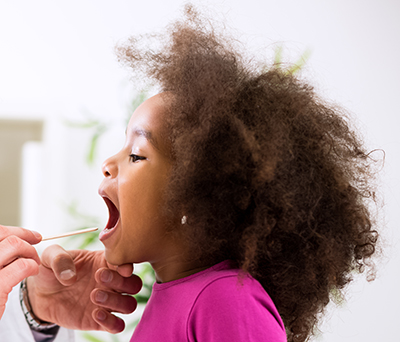
You could tell your little one was not feeling well — she had a low-grade fever, was refusing to eat and had tiny blisters in her mouth and on her hands and feet. Her pediatrician said not to worry; it was likely hand, foot and mouth disease and it just needed to run its course. Here are some facts about this viral infection with a name that sounds worse than it is.
Hand, foot and mouth disease is a viral infection with a harmless rash that can usually be treated at home. It is often confused with foot-and-mouth disease, a disease of cattle, sheep and swine. However, the two diseases are caused by different viruses and not related.
According to pediatrician Kristine Williams, MD, “Hand, foot and mouth disease is quite contagious, but is typically mild. It usually occurs in children ages six months to four years, but older children and adults can sometimes become infected.”
Typical symptoms include fever and blisters inside the mouth (especially on the tongue and sides of mouth), on the palms, soles and webs between the fingers and toes, and the buttocks and genital area. The rash can be painful.
Hand, foot, and mouth disease is most common in the summer and early autumn months, but can be seen at other times of year as well. It is spread when the virus is shed in saliva, fluid from one of the sores, mucus from the nose, or in stool. The main complication of the infection is decreased oral intake, which can lead to dehydration in some infants and children.
Your child can return to school or daycare after the fever has subsided and there are no active skin lesions — usually within two to three days. The mouth ulcers (blisters) should be gone within seven days, while the rash on hands and feet may last up to 10 days.
Pain and fever can be controlled with a children’s dose of acetaminophen or ibuprofen. A soft food diet is recommended and cold foods such as popsicles and ice cream can help to numb the pain; citrus, salty and spicy foods should be avoided.
Dr. Williams recommends calling your doctor if:
- Fever lasts more than three days
- Your child is drinking less than usual
- There are signs of dehydration (child refuses to drink, child has not urinated in six hours, child becomes weak or limp)
- Your child becomes worse
The following prevention tips will keep hand, foot and mouth from spreading:
- Wash hands often, especially after diaper changes.
- Avoid sharing eating utensils or drinking glasses with the infected person.
- Use soap and water to clean surfaces (like door knobs or toys) that may be contaminated with the virus. Then, disinfect with a solution of one tablespoon bleach to four cups water.
- Avoid close contact, like kissing or hugging, with an infected person.
- Make sure your whole family remembers to cover coughs when ill.